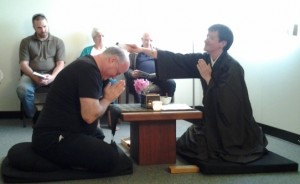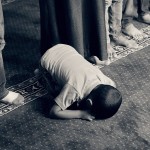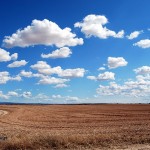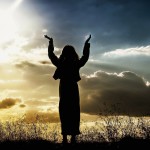 When I started my Journey of Conscience over a year ago, how to respond to the climate crisis was an open question for me. Activism? A radically altered lifestyle? Starting a Buddhist climate movement? All of the above?
When I started my Journey of Conscience over a year ago, how to respond to the climate crisis was an open question for me. Activism? A radically altered lifestyle? Starting a Buddhist climate movement? All of the above?
It may sound strange that I have decided to respond to the climate crisis by devoting myself wholeheartedly to simply serving as a Zen priest.
To those who care about the climate crisis – or any other critical situation in the world – it may sound like “simply serving as a priest” will mean foregoing my responsibility to participate in making the world a better place. In the minds of many people, religion is “otherworldly” in the sense that it either provides solace by encouraging you to anticipate a better life after death, or by encouraging you to detach from the world and thereby achieve a transcendent state that allows you to be happy no matter what’s going on. To many, religion can seem irrelevant to real struggles for justice and sustainability. Activism or social service can seem like an occasional add-on to the religious activities of inward-focused prayer or meditation, the performance of empty ritual, the contemplation of obscure scriptures, the formulations of dogmas, and the placement of judgment on the heads of non-believers.
Indeed, religion has its shortcomings. However, there are three compelling reasons I have decided the best way for me to address the climate crisis is to concentrate on being what I already am: a priest. Rather than trying to take on some kind of activism as well, and thereby fill multiple roles poorly, I plan to concentrate on one. Here’s why:
1) To sustain ourselves through the work that lies ahead, we need magic. These are the words of Joanna Macy, long-time Buddhist teacher and revered environmental activist. By “magic,” I mean a sense of the transcendent, the divine, or the “More.” By “magic,” I mean the swell of love, courage, compassion, and passion that can arise within you despite the odds you face. To many of us, it looks more and more like our planet will end up looking like the dismal, barren place of sci-fi dystopian visions of the future. If we’re going to prevent that from happening, we cannot succumb to despair. We’re going to need poets, musicians, artists, and visionaries as much as we’re going to need activists, politicians, and scientists. We’re going to need priests, ministers, and professed religious of all stripes to keep their own faith strong, and to keep the people they serve from losing hope.
2) When the world as we know it starts to unravel, we will seek refuge in That Which Does Not Depend on the World as We Know It. When you are experiencing peace and relative material comfort, it’s tough to care much about religion or spiritual transcendence. There are so many things to do, so many things to enjoy! Who cares about the deeper questions like “What does this all mean?” “What really matters?” “What happens after death?” “What can I ultimately rely on, when I lose everything?” I hate to be a doomsayer, but eventually the world as we know it in the wealthy “developed” nations will change. Drastically. If not in our lifetime, then in lifetime or our children or grandchildren. All the things we rely on – our economy, our social structure, the relative peace we experience in our daily lives, clean air to breathe and water to drink, access to unlimited food and energy – will change, and perhaps even collapse completely. Plenty of people on this planet already experience the repercussions of such collapse on a daily basis. When we experience this, let there be clergy among us, visible and recognizable because they wear the clothes of their faith, grasping the hands of the suffering and facing death with the courage they have forged in their sincere spiritual training. This is the job of professed religious: to be a tangible testimony to That Which Is Greater than all of the things we will lose.
3) Our deepest motivation has to be love. Love – a selfless devotion to the divine and to other beings – is the central message of all great religions. If you try to figure out the best course for yourself or the world through rational thought alone, you will get lost in a maze of pros and cons, profit and loss, risk factors and fears. If, instead, you are primarily motivated by love, all you have to do is your best. There is nobility and joy in actions taken out of love, even if they require pain, sacrifice, or risk. Who else but the priests, ministers, and religious of the world should lead the rallying cry of love in the battles that lie ahead?
I pray that some – or many – of the people I serve as a priest will take active roles in the climate movement, one way or another. If I can support them, then through them I can also have a tangible effect – perhaps a greater effect than if I tried to act myself.











